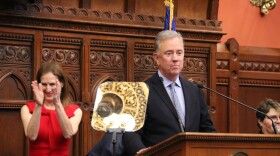Thousands of low-income families may soon see a reduction on their energy bill.
The U.S. Environmental Protection Agency (EPA) awarded Connecticut $62.5 million from the federal Solar for All program to expand solar power access in low-income communities.
One of the new programs funded with the federal dollars will incentivize Connecticut landlords to switch their multi-family properties over to solar power by providing necessary upgrades, according to Katie Dykes, state Department of Energy and Environmental Protection (DEEP) commissioner.
“That could include upgrades for roofs, or upgrades to the wiring in a building, upgrading electrical panels, or other types of electrical work that may be needed,” Dykes said.
Targeting multi-family, rental properties, the programs will lessen the financial burden for renters.
“Making our utility expenses more affordable, that's a really important component of reducing housing costs, especially for low income and disadvantaged residents,” Dykes said.
The money will also go toward executing new solar programs and expanding existing initiatives, including the Residential Renewable Energy Solutions and Energy Storage Solutions.
Connecticut requested $100 million from the EPA, which would have benefited 12,000 families. However, about 8,000 families will receive solar based on the $62 million that was awarded, Dykes said.
“I'm really interested to see how that kind of funding could help overcome barriers that building owners may be facing to installing solar and storage,” Dykes said.
A clearer outline of how much each program will receive in funding and what new incentives may look like will be ready in the coming months, Dykes said.
The program, called Project SunBridge, is designed to overcome current barriers for low-income and disadvantaged communities to access solar and storage energy technologies through a combination of financial and technical assistance.
“Investing in renewable energy is vitally important to reducing greenhouse gas emissions and addressing the climate crisis,” U.S. Rep. Jahana Hayes said.
Connecticut was one of 25 states and territories to receive a portion of the federal funding.
“As the climate crisis continues to disproportionately affect low-income communities, this federal funding will expand access to solar energy for underserved neighborhoods along our coast — a crucial step toward reducing our carbon footprint,” U.S. Rep. Jim Himes said.








